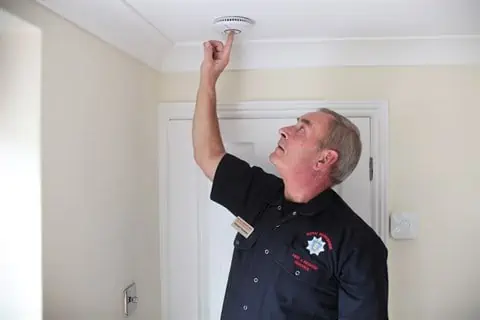
Royal Berkshire Fire and Rescue Service (RBFRS) is encouraging residents to reduce the risk of having a fire in the home this Home Fire Safety Week (28 September – 4 October).
We’re asking residents to make home fire safety a priority and ensure they have enough working smoke alarms in their home. In 2018/19, 254 fatalities occurred in the UK due to accidental dwelling fires. In 27% of accidental dwelling fires in England, the smoke alarm failed to operate. 50% of these failures were due to smoke not reaching the detector or the area not being covered by the detector. Following some simple safety advice can reduce the chance of your smoke alarm failing to operate.
- Smoke alarms should have a sealed battery compartment to prevent tampering or removal of the battery. You should replace your smoke alarm at least every 10 years, though it could even be every year, depending on the alarm. Make sure you know which type yours is.
- You should test your smoke alarm every week.
- A smoke alarm should be fitted on every level of your home.
- The National Fire Chiefs Council (NFCC) recommend an optical multisensor smoke alarm with a 10-year life span.
- Ensure you have a carbon monoxide alarm fitted in any room with a fuel burning appliance – it’s a highly poisonous gas that could have serious consequences for you and your loved ones.
Charlotte Lee, East Hub Protection Manager, said: “It is essential to know what to do if the worst happens and a fire does start. We strongly advise people to fit working smoke alarms on every floor of a home. It is also recommended that a heat alarm should be fitted in the kitchen. It is important to test your smoke alarms each week, as working smoke alarms can give early warning and save lives.”
However, the best way to keep yourself safe is to prevent an incident happening in the first place.
More people die in fires in the home ignited by cigarettes or smoking products than any other cause. We’re urging residents who do smoke in the home to ensure that any smoking products are fully extinguished and never to smoke in bed.
Take care if you use emollient creams, as new research from the NFCC shows that both paraffin and non-paraffin emollients can act as an accelerant when absorbed into clothing or bedding and exposed to naked flames or other heat sources.
Follow these simple tips to help keep yourself and your loved ones safe from a fire in the home:
- Plan an emergency escape route, and practise it with everyone you live with.
- Switch off appliances at the plug where possible before you go to bed.
- Don’t leave appliances such as dishwashers and washing machines running over night or when the house is empty.
- If you have a recalled appliance – don’t risk it, stop using it. Register your appliance at registermyappliance.co.uk for the latest recall information.
- Ensure all appliances are installed and maintained correctly by registered and suitably qualified tradespeople.
- Good housekeeping, like keeping ovens and filters clean, can prolong the life of an appliance and reduce the risk of fire.
- Check with older relatives, friends and neighbours as they may need help identifying issues with appliances and protecting themselves from the risks of an incident occurring.
- In the event of a fire, get out, stay out and call 999.
For more home safety advice, visit our Safety at Home page.